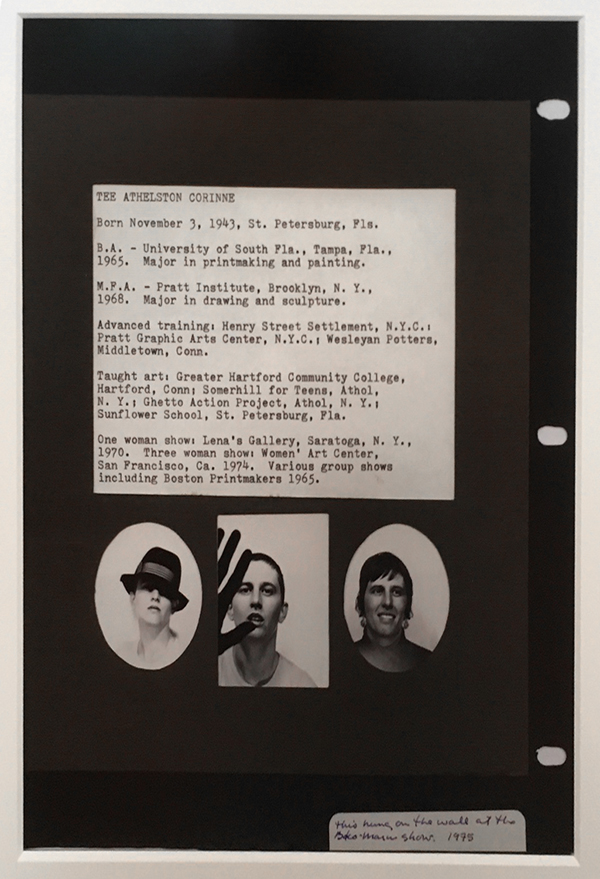

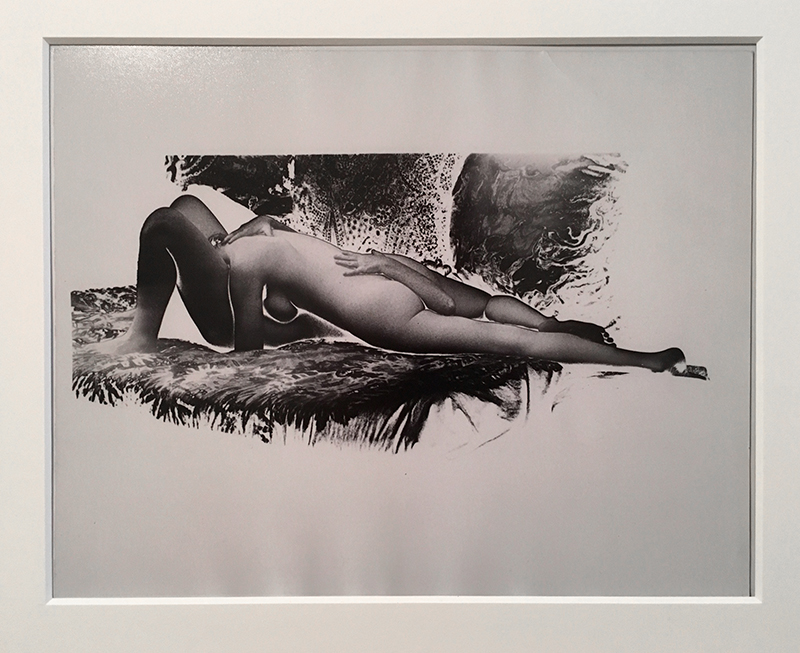
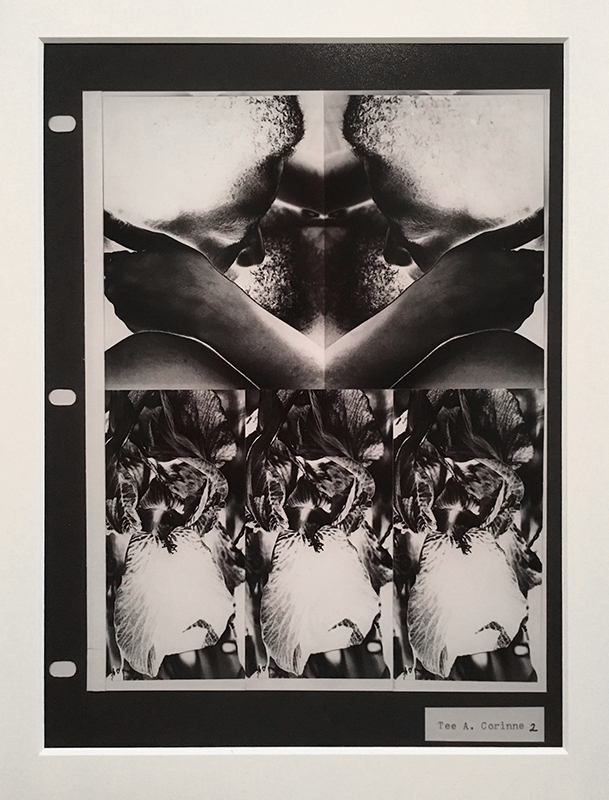
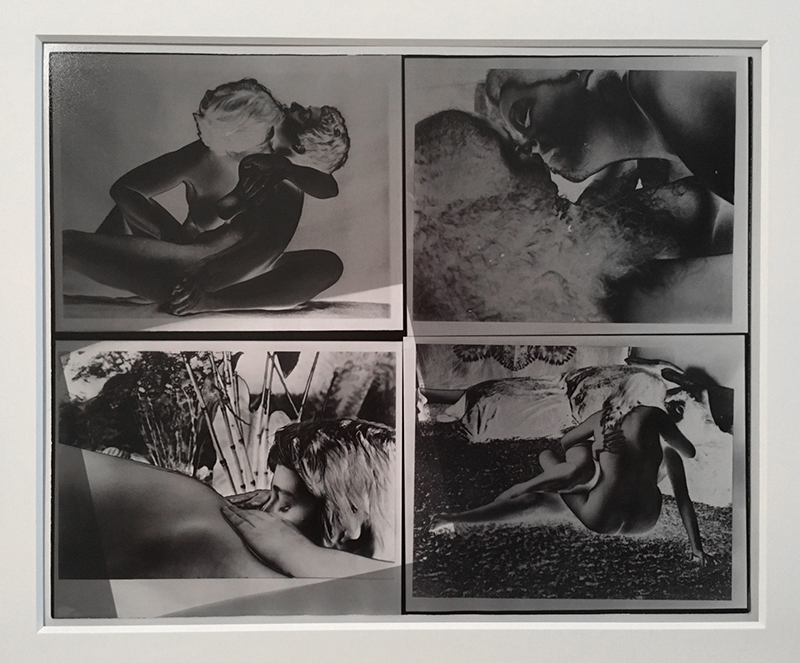
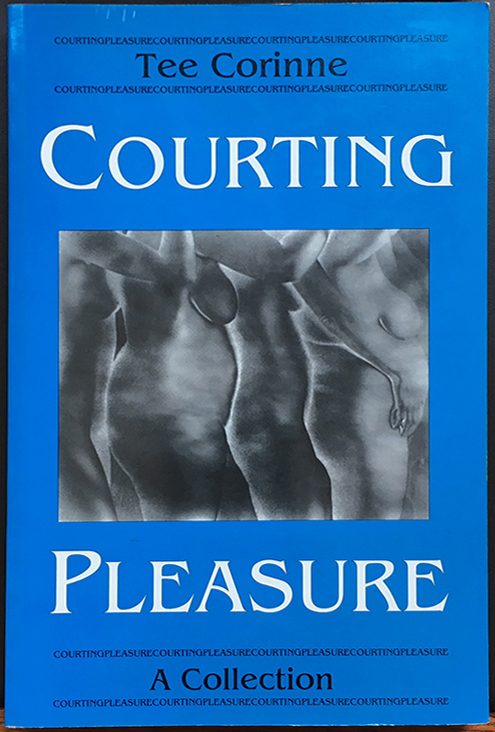
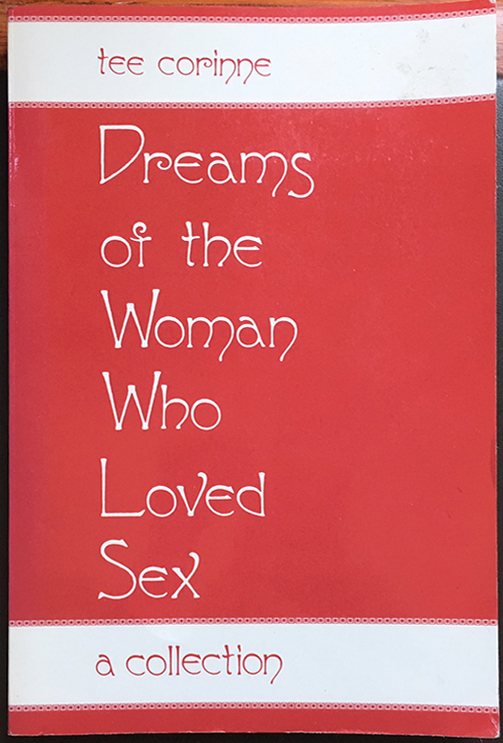
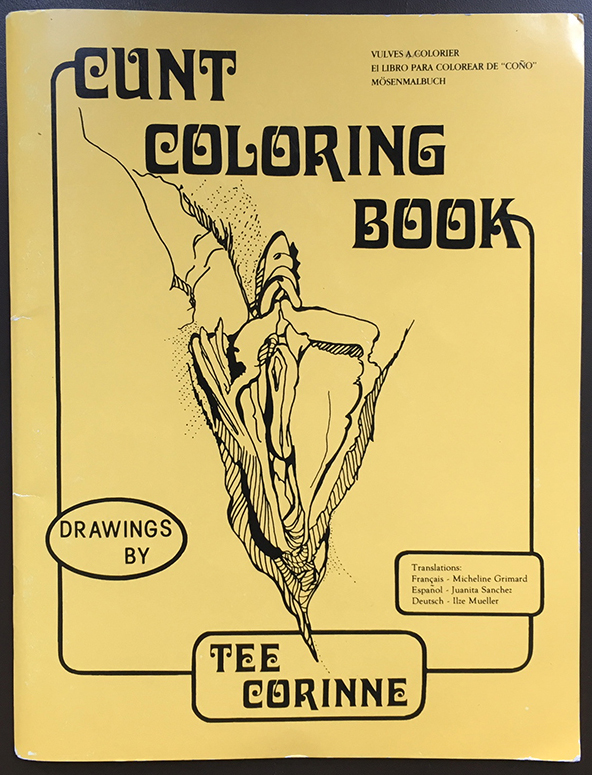

organized by Jenni Crain: Tee Corinne, Bodies of Work
organized by Jenni Crain
August 11th - September 15th, 2019
Saturdays and Sundays 12-5pm
or by appointment
take the A,B,C,D or 1 to 145th Street
MBnb
520 West 143rd Street no. 2
New York, New York 10031
www.broodthaers.us
MBnb is pleased to present Tee Corinne: Bodies of Work, an evolving presentation of materials relating to the extensive practice of Tee Corinne, organized by artist and curator Jenni Crain.
Over the course of this month-long presentation, Crain will utilize the MBnb space of the Broodthaers Society of America as a site to conduct further research into the diverse practice of Tee Corinne, the late photographer, author, editor, sex educator, and lesbian activist. Crain intends to compile her research into a comprehensive proposal for an institutional solo exhibition of the artist’s works to be held at a later date. Consequently the installation will be subject to shifting iterations as further materials are sourced, introduced, or represented in alternative methods, thereby allowing visitors access to content that is otherwise quite rare and inaccessible. Further programming in the form of slide presentations — a means of material circulation utilized by Corinne herself — or screenings is be hosted at MBnb during the course of the project.
Tee Corinne (b. 1943, St. Petersburg, Florida, d. 2006, Oregon) developed a body of work that celebrates Sapphic sexual relationships, placing an emphasis on the promotion of sensual pleasure. As Tamsin Wilton wrote in her essay "The Erotic Art of Tee Corinne,” Corinne’s “concern is with lesbians and sex, pure and simple, and she sees sex as central to lesbian identity and community.” In her own essay “Crafting Erotic Imagery,” Corinne described her interests: “I make images that bring me pleasure and that seem to be missing in the world around me.” Both essays are included in Corinne’s publication Intimacies (2001), which is available for reference at MBnb.
Corinne’s frequently made use of solarization in her photographs, a process that she attributed, in part, to preserving the identities of her subjects. Individual images were often represented in multiple artworks, reprinted at various ratios, or cut and compiled into kaleidoscopic photo-collages. Corinne explained that she wanted to create “images complex enough that people would want to stay with them for a long time.” Her subjects were almost always lesbian women. These women were typically depicted in rapt sexual relations, their subjectivities highlighted to “expand the boundaries of erotic participation.”
In an artist statement titled “On Sexual Art” (1993), Corinne believed that “reclaiming labial imagery was a route to claiming personal power for women.” Quintessential examples of this imagery may be found in two of the publications on view at MBnb: her now iconic Cunt Coloring Book, first published in 1975, and Yantras of Womanlove: Diagrams of Energy, published in 1982. The Cunt Coloring Book is complete with forty-two pages of line drawings of women’s genitals created by the artist between 1973 and the year of publication. Corinne considered coloring as an accessible, pleasurable, exploratory, and almost child-like process through which women could learn about what she referred to as “our eternal sexual anatomy.” Yantras includes thirty-four photographs and photographic collages created by Corinne between 1975 and 1982—many worked to her signature kaleidoscopic effect. Yantras also includes a number of close-up photographs of women’s vaginas printed in verso, in frequent kaleidoscopic abstraction, and in multiple.
In further works such as Isis in the Woods (1986), close crops of vaginas have been introduced into the landscape. Tamsin Wilton writes, “Isis in the Woods is a landscape showing sunlight outside a darkened wood, but in the foreground what briefly appeared to be a branch lying in the grass surrounded by leaf mold is suddenly transformed into a woman’s labia and pubic hair. It is too simple to see this as just another image of woman-as-landscape, in the familiar male photographic tradition.” She continues, “male photographers generally confine this romanticizing genre to coding buttocks/breast/belly as curving hills, or the nude female trunk as the torso of a tree. It is only when confronted with the shocking fact that Corinne’s trick makes the viewer look closely at a woman’s cunt that we realize how invisible this part of women’s bodies has been within the pseudo-romantic male fantasy type genre.” Wilton concludes, “Corinne’s celebration of woman in the woodland focuses on women’s sexuality, the seat of female sexual pleasure. In other words, precisely what is most often erased in the woman-as-landscape genre.” Such works constitute what Corinne called The Isis and Madonna Series.
Visual materials on view at MBnb include exhibition copies of photographs, photographic collages, and slides donated by the artist to The Lesbian Herstory Archives, New York, in the early 1980s. Also on view are publications produced by Tee Corinne of her collected photographic works, erotica, her prints of lesbian women throughout history, and a collection of landscape drawings. In addition, a variety of alternative sources acknowledging and assessing the artist’s works, such as Harmony Hammond’s Lesbian Art in America: A Contemporary History and Laura Cottingham’s Seeing Through the Seventies: Essays on Feminism and Art—both published in the year 2000—will be available for visitors’ reference. Since Tee Corinne’s work was frequently rejected by exhibition spaces and galleries due its subject matter being rendered explicitly pornographic, various publications associated with sex education and lesbian feminism offered outlets for the distribution of her imagery and writings. Historical publications that include reproductions of Corinne’s photographs have been reprinted for public perusal, for example Sinister Wisdom number 3 (1977) and the "Sex Issue" of Heresies (1981).
A special thanks is dedicated to Saskia Scheffer, archives coordinator of the The Lesbian Herstory Archives, and to The Lesbian Herstory Archives at large for their paramount support of this project. Each of the exhibition copies of Tee Corinne’s original works and materials have been scanned, printed and donated for the duration of this presentation from the collection of The Lesbian Herstory Archives, New York. Further gratitude is extended to Branden Wallace, registrar of the Leslie-Lohman Museum, and to the Leslie-Lohman Museum at large for allowing access into their collections and library archives for the purposes of Crain’s research. Final thanks go to Janice Guy and Joe Scanlan for their encouragement and support of this project.
* * *
Tee Corinne was raised in South Florida and later moved to New Orleans where she began her artistic studies at Newcomb College, Tulane University, between 1962 and 1963. She transferred to the University of South Florida where she would receive her BA in printmaking and painting with minors in English and Art History in 1965. She received her MFA from Pratt Institute in Brooklyn, New York, in 1968. Corinne moved to San Francisco in 1973 after divorcing her husband and became romantically involved with women for the second time in her life, following the “experimentation” of her teenage years. In the early 1970’s in San Francisco, Corinne took classes at the Institute for the Study of Human Sexuality, where she learned to organize her thinking through erotic imagery. It is around this time that Corinne began to draw other women’s genitals, having already been drawing her own for several years. In 1974, WomanSpirit magazine published a selection of these drawings in their second edition.
In 1975 Corinne began photographing women kissing and making love, often printing by using the solarization process she had learned while a student at Pratt Institute. In 1979 Corinne began experimenting with two-dimensional constructions built up with pieces of repeated and inverted photographic prints. From 1979–1981, Corinne was co-facilitator of the Feminist Photography Ovulars, a series of workshops and seminars that took place each summer to offer support and community for female photographers, especially those working remotely. Corinne was the cofounder of The Blatant Image: A Magazine of Feminist Photography that produced three editions from 1981–1983. Corinne won a Lambda Literary Award in 1990 for her work as editor of the erotic anthology Intricate Passions. She was cofounder and co-chair of the Gay & Lesbian Caucus, she also cofounded the Women’s Caucus for Art and the Lesbian & Bisexual Caucus.
In 1991, Corinne was chosen by the Lambda Book Report as one of the fifty most influential lesbian/gay individuals of the preceding decade. In 1997, she received the Women’s Caucus for Art President’s Award for service to women in the arts. In 2000, she received the Abdill-Ellis Lambda Lifetime Achievement Award. In the last years of her life, Corinne created the photographic series Cancer in Our Lives, which was comprised of portraits of lesbian writers and artists and documented their profound experiences with terminal cancer. Corinne herself was diagnosed with cancer just months after the death of her partner Beverly Brown in 2005. Corinne died in 2006.
* * *
Jenni Crain (b. New York, 1991–2021) co-organized March Avery’s exhibition at Blum & Poe, New York, and organized his exhibition at the Louise McCagg Gallery at Barnard College (both 2019). Other curatorial endeavors included exhibitions and programming at 55 Walker, New York; Pratt Institute, Brooklyn; and Shanaynay, Paris. Crain cofounded and codirected Topless, a seasonal gallery based in Rockaway Beach, NY, during the summers of 2014–2016. Crain was the founder/organizer of O.O. & M.M. (Only Once & Many More), an ongoing curatorial project that encouraged adaptability and deviation from standardized models of exhibition-making. As an artist, her work was exhibited in solo and group exhibitions at Octagon, Milan, and Gordon Robichaux, New York (2019); Baba Yaga, Hudson, New York (2018); 321 Gallery, Brooklyn (2017); KANSAS, New York (2016); Y Gallery, New York (2015); and Artist Curated Projects, Los Angeles (2014). Crain was a director at kaufmann repetto, Milan and New York, from 2016-2018. She left that position to pursue a masters degree at the Center for Curatorial Studies, Bard College.
August 11th - September 15th, 2019
Saturdays and Sundays 12-5pm
or by appointment
take the A,B,C,D or 1 to 145th Street
MBnb
520 West 143rd Street no. 2
New York, New York 10031
www.broodthaers.us
MBnb is pleased to present Tee Corinne: Bodies of Work, an evolving presentation of materials relating to the extensive practice of Tee Corinne, organized by artist and curator Jenni Crain.
Over the course of this month-long presentation, Crain will utilize the MBnb space of the Broodthaers Society of America as a site to conduct further research into the diverse practice of Tee Corinne, the late photographer, author, editor, sex educator, and lesbian activist. Crain intends to compile her research into a comprehensive proposal for an institutional solo exhibition of the artist’s works to be held at a later date. Consequently the installation will be subject to shifting iterations as further materials are sourced, introduced, or represented in alternative methods, thereby allowing visitors access to content that is otherwise quite rare and inaccessible. Further programming in the form of slide presentations — a means of material circulation utilized by Corinne herself — or screenings is be hosted at MBnb during the course of the project.
Tee Corinne (b. 1943, St. Petersburg, Florida, d. 2006, Oregon) developed a body of work that celebrates Sapphic sexual relationships, placing an emphasis on the promotion of sensual pleasure. As Tamsin Wilton wrote in her essay "The Erotic Art of Tee Corinne,” Corinne’s “concern is with lesbians and sex, pure and simple, and she sees sex as central to lesbian identity and community.” In her own essay “Crafting Erotic Imagery,” Corinne described her interests: “I make images that bring me pleasure and that seem to be missing in the world around me.” Both essays are included in Corinne’s publication Intimacies (2001), which is available for reference at MBnb.
Corinne’s frequently made use of solarization in her photographs, a process that she attributed, in part, to preserving the identities of her subjects. Individual images were often represented in multiple artworks, reprinted at various ratios, or cut and compiled into kaleidoscopic photo-collages. Corinne explained that she wanted to create “images complex enough that people would want to stay with them for a long time.” Her subjects were almost always lesbian women. These women were typically depicted in rapt sexual relations, their subjectivities highlighted to “expand the boundaries of erotic participation.”
In an artist statement titled “On Sexual Art” (1993), Corinne believed that “reclaiming labial imagery was a route to claiming personal power for women.” Quintessential examples of this imagery may be found in two of the publications on view at MBnb: her now iconic Cunt Coloring Book, first published in 1975, and Yantras of Womanlove: Diagrams of Energy, published in 1982. The Cunt Coloring Book is complete with forty-two pages of line drawings of women’s genitals created by the artist between 1973 and the year of publication. Corinne considered coloring as an accessible, pleasurable, exploratory, and almost child-like process through which women could learn about what she referred to as “our eternal sexual anatomy.” Yantras includes thirty-four photographs and photographic collages created by Corinne between 1975 and 1982—many worked to her signature kaleidoscopic effect. Yantras also includes a number of close-up photographs of women’s vaginas printed in verso, in frequent kaleidoscopic abstraction, and in multiple.
In further works such as Isis in the Woods (1986), close crops of vaginas have been introduced into the landscape. Tamsin Wilton writes, “Isis in the Woods is a landscape showing sunlight outside a darkened wood, but in the foreground what briefly appeared to be a branch lying in the grass surrounded by leaf mold is suddenly transformed into a woman’s labia and pubic hair. It is too simple to see this as just another image of woman-as-landscape, in the familiar male photographic tradition.” She continues, “male photographers generally confine this romanticizing genre to coding buttocks/breast/belly as curving hills, or the nude female trunk as the torso of a tree. It is only when confronted with the shocking fact that Corinne’s trick makes the viewer look closely at a woman’s cunt that we realize how invisible this part of women’s bodies has been within the pseudo-romantic male fantasy type genre.” Wilton concludes, “Corinne’s celebration of woman in the woodland focuses on women’s sexuality, the seat of female sexual pleasure. In other words, precisely what is most often erased in the woman-as-landscape genre.” Such works constitute what Corinne called The Isis and Madonna Series.
Visual materials on view at MBnb include exhibition copies of photographs, photographic collages, and slides donated by the artist to The Lesbian Herstory Archives, New York, in the early 1980s. Also on view are publications produced by Tee Corinne of her collected photographic works, erotica, her prints of lesbian women throughout history, and a collection of landscape drawings. In addition, a variety of alternative sources acknowledging and assessing the artist’s works, such as Harmony Hammond’s Lesbian Art in America: A Contemporary History and Laura Cottingham’s Seeing Through the Seventies: Essays on Feminism and Art—both published in the year 2000—will be available for visitors’ reference. Since Tee Corinne’s work was frequently rejected by exhibition spaces and galleries due its subject matter being rendered explicitly pornographic, various publications associated with sex education and lesbian feminism offered outlets for the distribution of her imagery and writings. Historical publications that include reproductions of Corinne’s photographs have been reprinted for public perusal, for example Sinister Wisdom number 3 (1977) and the "Sex Issue" of Heresies (1981).
A special thanks is dedicated to Saskia Scheffer, archives coordinator of the The Lesbian Herstory Archives, and to The Lesbian Herstory Archives at large for their paramount support of this project. Each of the exhibition copies of Tee Corinne’s original works and materials have been scanned, printed and donated for the duration of this presentation from the collection of The Lesbian Herstory Archives, New York. Further gratitude is extended to Branden Wallace, registrar of the Leslie-Lohman Museum, and to the Leslie-Lohman Museum at large for allowing access into their collections and library archives for the purposes of Crain’s research. Final thanks go to Janice Guy and Joe Scanlan for their encouragement and support of this project.
* * *
Tee Corinne was raised in South Florida and later moved to New Orleans where she began her artistic studies at Newcomb College, Tulane University, between 1962 and 1963. She transferred to the University of South Florida where she would receive her BA in printmaking and painting with minors in English and Art History in 1965. She received her MFA from Pratt Institute in Brooklyn, New York, in 1968. Corinne moved to San Francisco in 1973 after divorcing her husband and became romantically involved with women for the second time in her life, following the “experimentation” of her teenage years. In the early 1970’s in San Francisco, Corinne took classes at the Institute for the Study of Human Sexuality, where she learned to organize her thinking through erotic imagery. It is around this time that Corinne began to draw other women’s genitals, having already been drawing her own for several years. In 1974, WomanSpirit magazine published a selection of these drawings in their second edition.
In 1975 Corinne began photographing women kissing and making love, often printing by using the solarization process she had learned while a student at Pratt Institute. In 1979 Corinne began experimenting with two-dimensional constructions built up with pieces of repeated and inverted photographic prints. From 1979–1981, Corinne was co-facilitator of the Feminist Photography Ovulars, a series of workshops and seminars that took place each summer to offer support and community for female photographers, especially those working remotely. Corinne was the cofounder of The Blatant Image: A Magazine of Feminist Photography that produced three editions from 1981–1983. Corinne won a Lambda Literary Award in 1990 for her work as editor of the erotic anthology Intricate Passions. She was cofounder and co-chair of the Gay & Lesbian Caucus, she also cofounded the Women’s Caucus for Art and the Lesbian & Bisexual Caucus.
In 1991, Corinne was chosen by the Lambda Book Report as one of the fifty most influential lesbian/gay individuals of the preceding decade. In 1997, she received the Women’s Caucus for Art President’s Award for service to women in the arts. In 2000, she received the Abdill-Ellis Lambda Lifetime Achievement Award. In the last years of her life, Corinne created the photographic series Cancer in Our Lives, which was comprised of portraits of lesbian writers and artists and documented their profound experiences with terminal cancer. Corinne herself was diagnosed with cancer just months after the death of her partner Beverly Brown in 2005. Corinne died in 2006.
* * *
Jenni Crain (b. New York, 1991–2021) co-organized March Avery’s exhibition at Blum & Poe, New York, and organized his exhibition at the Louise McCagg Gallery at Barnard College (both 2019). Other curatorial endeavors included exhibitions and programming at 55 Walker, New York; Pratt Institute, Brooklyn; and Shanaynay, Paris. Crain cofounded and codirected Topless, a seasonal gallery based in Rockaway Beach, NY, during the summers of 2014–2016. Crain was the founder/organizer of O.O. & M.M. (Only Once & Many More), an ongoing curatorial project that encouraged adaptability and deviation from standardized models of exhibition-making. As an artist, her work was exhibited in solo and group exhibitions at Octagon, Milan, and Gordon Robichaux, New York (2019); Baba Yaga, Hudson, New York (2018); 321 Gallery, Brooklyn (2017); KANSAS, New York (2016); Y Gallery, New York (2015); and Artist Curated Projects, Los Angeles (2014). Crain was a director at kaufmann repetto, Milan and New York, from 2016-2018. She left that position to pursue a masters degree at the Center for Curatorial Studies, Bard College.